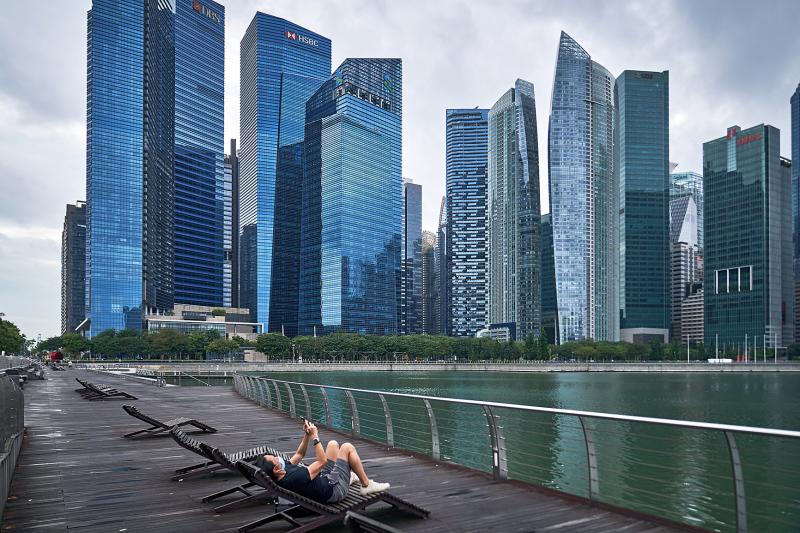Singapore’s central bank has told financial institutions (FI) to be vigilant to any suspicious transactions or fund flows between the city-state and Myanmar, a circular issued on Thursday last week showed, citing concerns over the potential for financial crimes.
The Monetary Authority of Singapore (MAS) reminded chief executives of financial institutions of the need for robust customer due diligence and appropriate risk mitigation measures in higher-risk situations.
The move came amid weeks of mass demonstrations in Myanmar after the military seized power.

Photo: Lauryn Ishak, Bloomberg
Democracy advocates yesterday pledged to hold more demonstrations in the Southeast Asian nation after the UN said that 38 people had been killed in the most violent day of unrest since last month’s coup.
Singapore’s position as one of the world’s leading financial centers and a trade hub makes it particularly vulnerable to money laundering due to large cross-border flows.
Singapore has close ties with Myanmar and is one of its biggest investors.
In the circular, the MAS urged financial institutions to keep timely tabs on the fast-developing situation in Myanmar, including unilateral sanctions imposed by other jurisdictions.
The situation in Myanmar could give rise to money laundering, terrorism financing and other financial crimes, it said.
“Given the developments in Myanmar, FIs are reminded to take appropriate measures to manage any risks arising from their business activities and customer relationships, including reputational, legal and operational risks,” the MAS said.
Financial institutions should file any suspicious transaction reports and inform it promptly, it said, adding that such reports should be labeled “Myanmar 2021.”
The circular was issued two days after the central bank said in a media release that its regular surveillance of the banking system had not found significant funds from Burmese companies and individuals in banks in Singapore.

Stephen Garrett, a 27-year-old graduate student, always thought he would study in China, but first the country’s restrictive COVID-19 policies made it nearly impossible and now he has other concerns. The cost is one deterrent, but Garrett is more worried about restrictions on academic freedom and the personal risk of being stranded in China. He is not alone. Only about 700 American students are studying at Chinese universities, down from a peak of nearly 25,000 a decade ago, while there are nearly 300,000 Chinese students at US schools. Some young Americans are discouraged from investing their time in China by what they see

MAJOR DROP: CEO Tim Cook, who is visiting Hanoi, pledged the firm was committed to Vietnam after its smartphone shipments declined 9.6% annually in the first quarter Apple Inc yesterday said it would increase spending on suppliers in Vietnam, a key production hub, as CEO Tim Cook arrived in the country for a two-day visit. The iPhone maker announced the news in a statement on its Web site, but gave no details of how much it would spend or where the money would go. Cook is expected to meet programmers, content creators and students during his visit, online newspaper VnExpress reported. The visit comes as US President Joe Biden’s administration seeks to ramp up Vietnam’s role in the global tech supply chain to reduce the US’ dependence on China. Images on

New apartments in Taiwan’s major cities are getting smaller, while old apartments are increasingly occupied by older people, many of whom live alone, government data showed. The phenomenon has to do with sharpening unaffordable property prices and an aging population, property brokers said. Apartments with one bedroom that are two years old or older have gained a noticeable presence in the nation’s six special municipalities as well as Hsinchu county and city in the past five years, Evertrust Rehouse Co (永慶房產集團) found, citing data from the government’s real-price transaction platform. In Taipei, apartments with one bedroom accounted for 19 percent of deals last

US CONSCULTANT: The US Department of Commerce’s Ursula Burns is a rarely seen US government consultant to be put forward to sit on the board, nominated as an independent director Taiwan Semiconductor Manufacturing Co (TSMC, 台積電), the world’s largest contract chipmaker, yesterday nominated 10 candidates for its new board of directors, including Ursula Burns from the US Department of Commerce. It is rare that TSMC has nominated a US government consultant to sit on its board. Burns was nominated as one of seven independent directors. She is vice chair of the department’s Advisory Council on Supply Chain Competitiveness. Burns is to stand for election at TSMC’s annual shareholders’ meeting on June 4 along with the rest of the candidates. TSMC chairman Mark Liu (劉德音) was not on the list after in December last